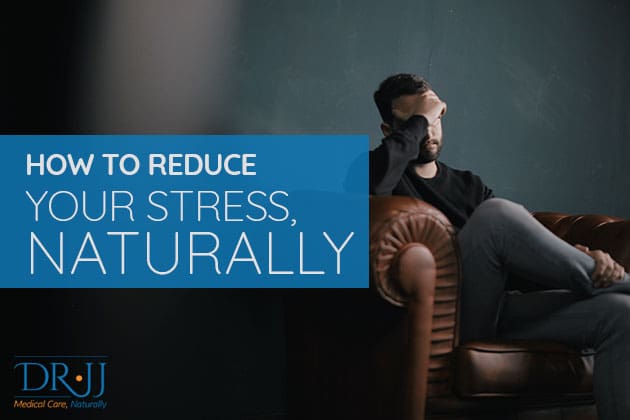
Stress is a feeling of worry about something in the present moment, or in the future.
Every one of you deals with a bit of stress from time to time.
This worry can be temporary or chronic.
When it becomes chronic, you may want to consider seeking out a Naturopathic doctor in Toronto to manage your chronic stress.
This is because, when this level of stress becomes overbearing, it can make you more susceptible to numerous health issues.
The health issues that chronic stress can cause include:
Anxiety and stress often go head in head.
Where there’s stress, there may be anxiety.
When your anxiety gets out of hand, it can cause the development of an anxiety disorder.
An anxiety disorder occurs when your anxiety levels become out of proportion with reality.
Stress can impact your life in truly surprising ways, and it prevents you, as a human being, from being calm, centered, and whole.
The kind of calm, centered and whole you might get from doing yoga.
That’s why I got together with vitamin enthusiasts to do an informational video on naturopathic stress solutions.
Is All Stress Bad?
No, not all stress is bad.
You need stress in your life to send messages to your brain about the situations you’re in.
Stress can help find passion and excitement that allows us to be fulfilled as people.
Stress can also help us when we are in a situation where it is life and death.
For instance, if you’re being attacked by a bear, you would want your fight or flight systems to spring into action to protect you and keep you alive.
In these types of situations, you’ll be stressed out – understandably so.
You may also feel stressed when you do something you feel you shouldn’t do in the future.
This stress is normal.
Such as, when you are late for work and feel horrible physically because of the situation you are in.
This stress forces you to avoid it in the future.
This level of stress is good because it means you get to keep your job and keep putting food in your belly.
The same food that keeps your mind fueled to maintain energy to keep said job.
If you weren’t stressed about this situation, it may actually be a problem.
Not having stress about a natural situation like this could result in the loss of a job due to being careless, and a subsequent loss of income.
You also need the energy and excitement that is the other side of stress, as these give you the boost to take on challenges that you need to grow as a person.
There’s a scale, however, and you should neither be bored, nor overly worried.
If you start consistently creeping into the 6 or 7 out of 10 range of stress, then it’s time to take action.
Stress becomes problematic when it’s occurring outside the range of reality.
Keep in mind that your stress level and tolerance will not be the same as someone else’s.
Your response to stress and how you handle stressful situations is also largely determined by how your family members used to behave as you were growing up.
If you had an overly critical family member as a child, for example, this may cause you to be at a higher risk for chronic stress, and anxiety disorders.
How Can Stress Affect Your Health?
Stress can impact pretty much every aspect of your health and life.
The real question here should be: what CAN’T stress affect?
Stress is a risk factor for most diseases, including:
- Cancer
- Stroke
- High blood pressure
- Heart attack
- IBS
- PMS
- celiac disease
- And many others
Stress also increases inflammation in the body and is linked to heart disease.
This is because a higher amount of inflammation increases blood pressure and lowers your “good” HDL cholesterol, which causes increasing issues for your heart.
Stress is responsible for about 80% of the people who walk through my door.
This is especially true when you take into account how stress can weaken your immune system, which can lead to an increased recurrence of colds, flu, and other illnesses.
The good news is, there are many foods you can eat that have the nutrients needed to manage your stress and reduce yop.
These include: vitamin B6, vitamin C, and magnesium.
5 Strategies To Reduce Stress
Luckily, in the last decade, a lot of research has gone into stress management, and some new techniques have been developed.
Many doctors now recognize that naturopathic stress reduction strategies are important to overall levels of health and wellness.
Here are the top five from Rosalie Moscoe, RHN:
1. Look At What’s Bothering You
Step one is to look closely and honestly at what is really stressing you out.
What is stressing you out may not even be what you think it is.
Start by getting out a piece of paper, and listing all the things that currently stress you out.
Get all of these thoughts out of your head where it only ruminates endlessly.
The second part to this step is assessing this list, and prioritizing the actions that you need to take on it.
That way, you can handle the ones first that are causing you the most stress.
2. Adjust Your Perception Of Stress
It’s true that everyone perceives things differently, and stress is no exemption.
Is your perception of your stress accurate though?
Ask yourself if it’s really as bad as you think, or is your perception of events making you more stressed?
Your thoughts about an event that occurred or what other people think about you can actually cause you to go down the rabbit hole of endless rumination.
Remember that you can talk yourself into further stress as well as talking yourself down from a stressed situation.
You have more control over your thoughts than you think, and you can use them to manage your stress.
On the same piece of paper you wrote your thoughts down on, write down all the facts you can use to counteract these thoughts.
Ask yourself: is this thought realistic or am I blowing it out of proportion to the situation?
If the thought is out of proportion to the facts of the situation, what can you do to calm yourself?
Start by telling yourself that you’re okay and that you can calm down and get through this moment.
Tell yourself other positive things that matter to you, because these positive thoughts, even if forced, reduce your brain’s perception of the stress you are feeling.
3. Chill Out
Have you ever travelled to a tropical country and noticed how the pace of life is different?
You can rush around too much, and it affects your stress dramatically.
If you just slowed down your talking, walking, working and thinking, you would feel far calmer and far better.
You may overcommit yourself in your daily life and not take enough time for yourself.
This burns out your adrenal glands, which have many additional negative effects on your health.
It also can lead to an increase in cortisol from chronic stress and may even trigger thyroid issues.
4. Get The Health Trio Working For You
The trifecta of health, are buffers that you can utilize to stave off many illnesses and conditions, amongst them: stress.
This “health trio” is: exercise, nutrition and optimal sleep.
However, they are interconnected, and they depend on each other to reach their potential in helping your health.
So, be sure to make time for all three.
5. Get Social
Don’t shy away from friends when you’re feeling stressed, it will only make you feel alone, which will worsen your negative feelings.
You can still have fun even when you are stressed, so go for a walk with a friend or have lunch with a sibling, and take advantage of the time to talk it out.
When it comes to talking it out, for women oxytocin is a wonderful chemical that gets released when they’re hanging out with other women or with kids.
This chemical is released by your body in order to facilitate feelings of calmness and safety.
Dr. JJ’s Supplement For Stress Reduction – Russian Ginseng (Rhodiola)
An adaptogen is an herb that helps you manage during a time of stress.
It also helps with strengthening the body and improving your overall tolerance to stress.
The most common adaptogen is Russian ginseng, or Rhodiola, and it seems to work very well for women (specifically).
If that’s not enough for you, then it can also help with:
- Improving the length and quality of your sleep
- Reducing risk of kidney disease
- Improving your memory and reducing risk of Alzheimer’s
- Reducing your risk of bone conditions like osteoporosis
- Reducing your risk of autoimmune disorders
- And more
Questions? Ask Dr. JJ
While many of these recommendations are quite simple, implementing them effectively can be complicated.
That’s where I come in.
Call my clinic now to book your appointment and let me help you navigate your options in reducing your stress naturally.
Book your appointment with me, Dr. JJ, today.
If you have questions about naturopathic medicine, or you’d like to take your first step into the world of naturopathy, contact me, Dr. JJ, and let’s book an appointment.
Yours in health,
Dr. JJ Dugoua, Naturopathic Doctor
600 Sherbourne St, Suite 315,
Toronto, ON M4X 1W4
-https://goo.gl/maps/6VDXwiCihRpDRo5A9
Dr. JJ Dugoua is a naturopathic doctor in Toronto and has a PhD in Pharmaceutical Sciences. His clinic provides solutions for many health concerns and has a special focus on thyroid health issues.



